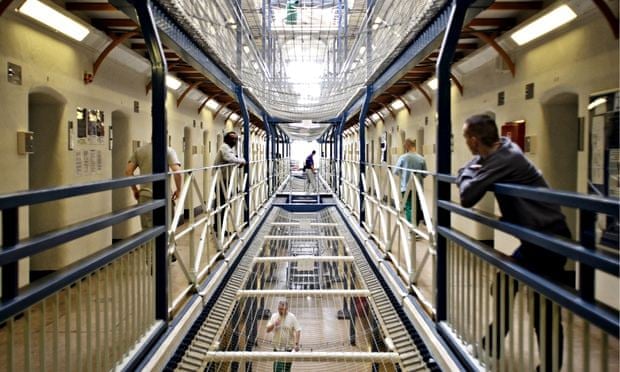THE GUARDIAN (23/11/14) UK’s mentally ill people more likely to be found in jail than hospital

Each decade in Britain appears to contain a symbolic, heinous murder – a crime so awful that it reflects a nation’s pathologies as well as its fears. In the 1990s, the death of James Bulger, a two-year-old who was abducted from a Merseyside shopping centre before being tortured and killed, led to the age of criminal responsibility being changed.
The next decade began with the case of 10-year-old Damilola Taylor, who bled to death after being assaulted on a south London stairwell, presaging years of concern over the rise of such attacks.
This month has seen a gruesome case which again holds up a mirror to the state of Britain. The events that led to Matthew Williams, found eating the face and eyeball of a 22-year-old woman he had lured into his room at Caerphilly’s Sirhowy Arms hotel, can be used to give a diagnosis of one of society’s most visceral ills: that prisons, not hospitals, are the place to find the mentally disturbed.
There are about 16,000 mental health beds in the NHS, while the Centre for Mental Health estimates that about 21,000 people behind bars – a quarter of the total prison population – have bipolar disorder, depression or personality disorders.
Prisons also disproportionately house those who have the most serious mental illnesses. About a quarter of women and 15% of men in prison reported psychotic episodes. The rate among the general public is about 4%.
Williams, who had had paranoid schizophrenia since he was a teenager, had been released from jail two weeks before the attack. He appeared to be a man lost, prey to delusions and hallucinations that had haunted him for years.
It’s certainly what his mother, Sally Ann Williams, thought. Interviewed by the BBC days after the murder, she claimed her son had been unable to access the medication he needed to keep his condition in check. She argued that her son, who died after police fired a Taser at him to try to force him away from his victim, should have been in hospital rather than living with little or no supervision in the community.
None of this surprises Jeremy Coid, professor of forensic psychiatry at Queen Mary University of London. He points out that less than 25% of prisoners who screen positive for psychosis subsequently received an appointment with a mental health professional after release. In a paper last year he said that failing to effectively screen prisoners’ mental health inevitably led to tragedy.
He told the Guardian: “Our work, which looked at 1,000 cases, showed released prisoners with schizophrenia are three times more likely to be violent than other prisoners, but only if they receive no treatment or follow-up support from mental health services.”
It did not have to be like this. In the dying days of the last Labour administration, ministers produced the Bradley report – a blueprint for reform of the criminal justice system and healthcare to ensure that prisoners did not languish behind bars without help. Ministers had been spurred into action by a series of hard-hitting warnings from charities such as the Prison Reform Trust, which pointed out that a third of prisons frequently saw prisoners who were too ill to be in jail.
However, the Bradley report was shelved by this government, which instead has brought about huge upheavals in the prison service and the NHS. In the past three years the public prison service has seen its budget cut by £263m and is struggling to cope with the loss of more than 12,500 (28%) of its staff since 2010 at a time of an ever-rising prison population. Probation services that will oversee the “medium and low risk” released prisoners are to be privatised.
At the same time the health service has undergone radical change. Budgets have been outstripped by patient demand, especially in mental health. In the summer the Royal College of Psychiatrists warned that NHS mental health services were “running dangerously close to collapse”. Analysis by the Health Service Journal found that there were now 3,640 fewer nurses and 213 fewer doctors working in mental health compared with two years ago.
Juliet Lyons of the Prison Reform Trust wants an independent inquiry into the issue of prisoner mental health, saying that the proposed “serious further offence review” into the Williams case does not go far enough.
Retrouvez l’intégralité de l’article sur le site du Guardian


Laisser un commentaire
Vous devez vous connecter pour publier un commentaire.